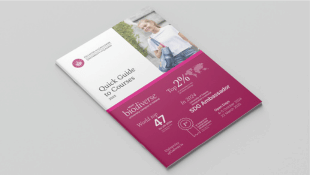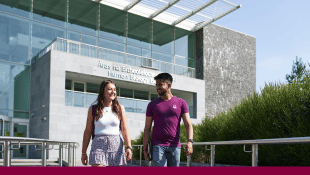-
Courses

Courses
Choosing a course is one of the most important decisions you'll ever make! View our courses and see what our students and lecturers have to say about the courses you are interested in at the links below.
-
University Life

University Life
Each year more than 4,000 choose University of Galway as their University of choice. Find out what life at University of Galway is all about here.
-
About University of Galway

About University of Galway
Since 1845, University of Galway has been sharing the highest quality teaching and research with Ireland and the world. Find out what makes our University so special – from our distinguished history to the latest news and campus developments.
-
Colleges & Schools

Colleges & Schools
University of Galway has earned international recognition as a research-led university with a commitment to top quality teaching across a range of key areas of expertise.
-
Research & Innovation

Research & Innovation
University of Galway’s vibrant research community take on some of the most pressing challenges of our times.
-
Business & Industry

Guiding Breakthrough Research at University of Galway
We explore and facilitate commercial opportunities for the research community at University of Galway, as well as facilitating industry partnership.
-
Alumni & Friends

Alumni & Friends
There are 128,000 University of Galway alumni worldwide. Stay connected to your alumni community! Join our social networks and update your details online.
-
Community Engagement

Community Engagement
At University of Galway, we believe that the best learning takes place when you apply what you learn in a real world context. That's why many of our courses include work placements or community projects.
Outgoing Students
Interested in going on Erasmus?
If you are a University of Galway student considering studying abroad with the Erasmus+ Programme, this page should give you a basic understanding of the University's involvement in the student mobility element of the programme and the opportunities available for studying in Europe.
For up-to-date information, our Outgoing Student Handbook and documentation relating to Erasmus+ study visits, please see our Latest News page.The Erasmus+ Programme
University of Galway has participated in the Erasmus+ Programme since its inception in 1987 and several thousand of our students have taken part. Almost all of them have found it to be a most rewarding experience.
Erasmus+ gives students the possibility to study or work in another European country and in doing so, to gain credit towards their degree. It's a great way to gain international experience, expand your academic horizons, meet people from all over the world, improve your language skills, learn about other cultures, develop independence and self-confidence, boost your CV...need we say more?
On this page, we will concentrate quite a bit on the study visit aspect of Erasmus+ - that's when you go to one of our partner universities abroad and are enrolled there as an exchange student. You might not have known that Erasmus+ also allows students to gain work experience abroad, and you can read more about that in the section on Erasmus+ Traineeships. But for now, read on a little further...
The following are the basic guidelines set out by the European Union to govern the Erasmus+ exchange programme:
- The programme is open to students in the Member States of the European Union, the three countries of the European Economic Area (Iceland, Liechtenstein and Norway), and Turkey.
- Students will not be required to pay tuition fees at the host institution abroad; they will, however, need to register with and pay the normal fee to their home institution (University of Galway) during their period of study or work abroad.
- The minimum study period abroad is two months (60 days), and it cannot be more than 12 months in total during any one study cycle (i.e., at undergrad, Master, or PhD level). For Erasmus+ Traineeships (work placements), the minimum duration is also 60 days, and the maximum 12 months, in any one study cycle.
- Students may apply to their home university for an Erasmus+ mobility grant to help with the costs of living abroad.
- Students must get approval from both their home and host institutions for their course of study or programme of work abroad: this is all set out clearly in advance, in an important document called the Learning Agreement. Students must get formal recognition from their home university if they complete satisfactorily all the courses or activities described in the Learning Agreement.
- Students in the first year of third-level study are not eligible to participate.
- Students from outside of Ireland will not normally be nominated to study abroad in the country where they grew up.
All third-level students are eligible to participate in the programme, up to and including doctoral level. However, please keep in mind that an Erasmus+ experience is, unfortunately, not available to all University of Galway students. Our Erasmus+ study places abroad are based on bilateral agreements with specific universities in (mostly) specific subject areas. Your programme of study here may not provide a "window" for you to study or work abroad, you may not have the necessary language skills to undertake studies in a particular country that attracts you, or your particular Discipline may not have signed exchange agreements of its own, so the opportunities in your area may be limited. Having said that, the number and range of Erasmus+ exchanges is expanding each year. There are currently about 500 study abroad places available for University of Galway students.
If you want to explore the possibilities further, please talk to the relevant Erasmus+ academic coordinator, or visit the International Office. If you click on the "Latest News" link on the left-hand menu, you will find, among the documents available to download, the Handbook for Outgoing Erasmus+ Students. Towards the back of the handbook is a full list of all our Erasmus+ links in the various Disciplines and Schools, and contact details for all the Erasmus+ academic coordinators.

Can I go on Erasmus+? Do I need to be studying a language?
If you are an Arts or Commerce student studying a continental language, you will generally be expected to spend a year attending a university abroad (or doing a teaching assistantship, which is also now recognised as satisfying the BA International language requirements). Your language department coordinator will talk to you in Second Year about possible host universities, and, in the case of Arts students, the destination to which you are assigned may depend on your second degree subject and the availability of suitable modules in that subject at any given host institution.
If you are an Arts or Commerce student who isn't taking a continental language, it is also possible to take part in Erasmus+. We have a number of partner universities that offer courses through the medium of English. In the case of Arts, participating students will spend a full year studying their two degree subjects abroad, and will be expected to secure 20 ECTS in approved courses in each of those subjects (that's 40 ECTS in total) in order to pass the year and be eligible for a BA International. The Handbook for Outgoing Erasmus+ students will give you an idea of what is involved in the programme, as well as showing a list of Erasmus+ links by Discipline or School.
Commerce students who aren't taking a language will be informed about study abroad opportunities (BComm International Experience/BComm Global) by the School of Business.
If you are studying Law with a language, you will have the opportunity to study abroad for a year; again, your language department coordinator will be able to advise you. There are also opportunities for non-language Law students, and the Law School will advise Second Years on these.
If you are a Science student taking Biochemistry or related biosciences, there is the possibility of spending one or two semesters attending courses at a partner university during third year. In addition, Biotechnology students have an opportunity to apply for an Erasmus+ traineeship for a three-month placement involving project work in a laboratory abroad. A knowledge of a continental language is not essential, but it will expand your options and it will allow you to derive more from your time abroad if you are selected to take part in Erasmus+.
If you are studying Medicine, you will have the possibility of carrying out a clinical placement at a partner university abroad for three months in Semester 2 of Third Year. As with Science above, there are some opportunities to do this through the medium of English, although most of our available study places in this particular subject area do require a knowledge of either French or German.
If you are an Engineering student, you may be able to take part in an Erasmus+ placement for your Professional Experience Programme in Third Year. You should look at the Career Development Centre's website. Foreign language skills aren't essential, but they are useful and will expand your options.
Other Disciplines: students of Denominated Psychology, Film Studies, Drama, Journalism, Music, and Physics may also avail of Erasmus+ places, and should contact the relevant Programme Directors for further information. In some cases, foreign language skills may be required.
Downloads
-

Undergraduate Prospectus 2026 PDF (12.4MB)
-

Postgraduate Prospectus 2026 PDF (3.2MB)
-

Quick Guide to Courses 2026 PDF (1.20MB)
-

A-Level Quick Guide to Courses 2025 PDF (1.04MB)
-

Pre-Arrival Guide 2025 PDF (1.6 MB)
-
.png)
Brazil Student Guide PDF (3.2 MB)
-
.png)
Chile Student Guide PDF (3.1 MB)
-
.png)
Colombia Student Guide PDF (3.1 MB)
-
.png)
Ghana Student Guide PDF (3.4 MB)
-

Hong Kong Student Guide PDF (3.6 MB)
-

Indian Student Guide PDF (3.5 MB)
-
.png)
Indonesian Student Guide PDF (3.2 MB)
-

Malaysian Student Guide PDF (3.6 MB)
-
.png)
Mexico Student Guide PDF (3.1 MB)
-

Nigeria Student Guide PDF (3.4 MB)
-
.png)
North American Student Guide PDF (2.9 MB)
-
.png)
Panama Student Guide PDF (3.1 MB)
-

South African Student Guide PDF (3.7 MB)
-
.png)
Taiwan Student Guide PDF (4.0 MB)
-
.png)
Thailand Student Guide PDF (3.6 MB)
-
.png)
Turkish Student Guide PDF (4.2 MB)
-
.png)
UAE Student Guide PDF (3.4 MB)
-
.png)
Vietnam Student Guide PDF (3.39 MB)















